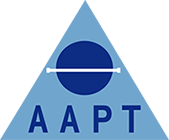News
AAPT Mentoring Day - a report
Nicky Wright MAAPT gives an overview of the recent Level 3/4 Mentoring day
Friday 17th February was the first mentor’s day for the Level 3 Diploma APT course, held at the AAPT in London. The day was run and organised by Michelle Lancaster, with Emma Romeling and Sarah Davies (both assessors for the Level 3 Diploma APT course).
Overview of the Level 3 / 4 Diploma
Michelle Lancaster gave an overview of the level 3 Diploma APT course and how the two centres help and support the TAPTs. The course is currently run by two centres, North Tees Hospital and Forth Valley Hospital. There is a slight difference between the 2 centres.
North Tees provides teaching to students by having them attend the centre 5 times in the first year and provides online support that include emails sent to students and their mentors. While Forth Valley provide information and teaching to the students in a one week block and additional support given following the exam days. The 2 centres use the same assessors and each assessor is allocated by Emma Romeling.
Chester University is currently running the Level 4 Diploma course and there are 8 students on the course. Michelle Lancaster is the currently the lecturer for the university and discussed the syllabus with the mentors and the differences between the level 3/4.
Common practical assessment standards
Emma Romeling went over the common practical standards that all TAPTs must adhere to during the practical assessment examination. TAPTs must show the assessor's on the day how they meet these standards in their own mortuary during a post mortem examination and setting up of a viewing of a deceased patient.
What is a good mentor? Hints and tips on supporting your TAPT
The day was very informative with a series of talks on how the Level 3 course centre supports the trainees and what is expected of them and also offered tips and advice on how mentors can help get the best out of their trainees.
Being a mentor when we are busy can be time consuming and difficult, however the mentors day highlighted that as mentors we become the TAPTs role model and our vast amount of experience allows us to cope with many challenging situations, this we can impart onto the TAPTs with guidance and support, by building their confidence and making them feel a valued member of the team.
This can be achieved by talking to the TAPTs at every opportunity, either during clean down of the PM room or over a quick coffee. Introduce them to other departments, e.g Health & Safety, Histology or Microbiology staff and include them in meetings or decisions, this investment will help you and the TAPTs by making them feel supported, validated, encouraged and together build a confident and competent APT.
Workshop - how to write an effective witness statement / how to prepare your students for exams.
The day provided help and advice for mentors in all areas of the training for the TAPTs, by providing mentors an opportunity to work in groups and learn what makes a good reflective learning statement and how to write a witness statement. This was very helpful and was received well by all; everyone seemed to write a reflective learning statement and enjoyed the experience, there were sounds of laughter coming from all groups.
The external assessment process - what to expect on the day
Sarah Davies ran through a typical assessment day and what's she expects from the TAPT. The assessors ask for Sops before the day so they are aware how that particular mortuary works, she can then assess the TAPT to the Sop and the common practical standards.
The assessor and the TAPT will liaise with one another to confirm a date that is both convenient for the assessor, TAPT and the mortuary. The assessment should only need one day, however if no PMs are scheduled for that day, then the assessor will have to attend the mortuary on another day.
The assessors are not there to assess the mortuary itself, just the TAPT. Though not required, but a tour of the mortuary and introduction to other staff might help the TAPT settle with the assessor before going into the PM room and starting the practical exam.
Assessors may approach the day differently, questions may be asked of the TAPT during the post mortem/viewing process or a series of questions asked after. All help the assessor make a final report of the day. The portfolio is then handed to the assessor for marking. Both reports and the portfolio once marked is then sent to the centres for internal verification.
I found this day very helpful and informative and would recommend others who are either mentors or will be in the future to attend. The day gives a very comprehensive account of what is expected from the TAPTs as well as how mentors can help and support them in all aspects of their training.
It's good to see the process from the point of view of the assessor and going through the process myself, I now have a complete overview from both sides. I feel confident with the advice given on the day to take back and implement in my own mortuary.
